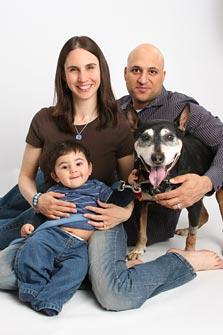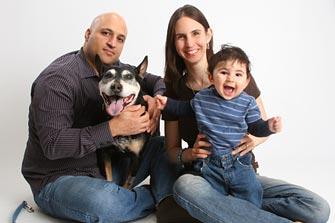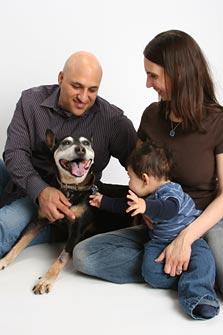Bringing home a baby is scary enough. But for new parents Beth and Dave Cruz, their overzealous dog could not contain his excitement around their newborn, prompting extreme measures to safely introduce Stitch to their baby.
They knew in advance that Stitch wasn’t good with children, loud noise and fast movements. At the same time, they weren’t about to give up on him. Still, they had their work cut out for them.
An unexpected turn of events added to Stitch’s uneasiness. The year befo

re, Marley, one of the couple’s three dogs, had passed away. “When Marley passed, it was just Jessie and Stitch,” Beth says.
The day came for Beth to go to the hospital, where she gave birth to Ezra Benjamin. But in the midst of that happy day, 13 hours later, Jessie passed away. The loss of Stitch’s remaining companion, coupled with a new baby, was too much for Stitch, an Australian cattle dog mix, to adjust to. In just a day, Stitch had lost a canine companion and gained a human one. He needed help transitioning.
“When we first brought the baby home, Stitch wasn’t jealous,” Beth says. “He was excited. His excitement level would escalate. There was a part of him that was excited in a happy way. But he had no ability to feel comfortable and safe.”
He barked at the baby. So, the first night, Dave slept with Stitch in the couple’s home office. Stitch, however, couldn’t settle in.
“He was off,” is how Beth describes it. “So, we sent Stitch to my parents’ house the first two weeks. He loves my parents, and everything was fine. It gave us time with our son.”
But always on their minds was bringing Stitch home and reintroducing him to Ezra. They sent some of Ezra’s clothes to Beth’s parents, so Stitch could get used to the baby’s scent.
Also, in anticipation of bringing home their baby, Beth had sought advice from trainers, including Sherry Woodard, an animal expert for Best Friends.
“I’d gotten advice from Sherry even before the baby was born,” Beth says. “The reality was I had enough experience and knew enough trainers that we were going to make it work.”

Determined, Beth’s parents brought Stitch back home for training on the weekend. “In the beginning, we kept him on a long lead the entire time,” she says. “We did it to desensitize him. Sherry said it was possible Stitch wouldn’t be able to handle more than five minutes with Ezra.”
“The first time,” she says, “I remember we were on the front porch. My dad was holding the dog, and every time Stitch reacted to the baby, my dad called him, gave him positive reinforcement and redirected his energy with a treat. Within two minutes, I saw that it wasn’t working. The treats actually excited Stitch. I am very grateful that I recognized that approach wasn’t going to work.”
Instead, they redirected him by having Beth’s father call Stitch away from the baby. “Stitch was like, ‘Yeah, I get to follow Grandpa.’ It was positive reinforcement, and it snapped him out of being obsessed with the baby.”
By the end of that first session, Stitch settled in and lay down in a dog bed while still on a leash. But the moment the baby cried, “He totally lost it again,” Beth says.
“As soon as Stitch saw movement from the baby, he’d bark, but my dad would say, ‘Leave it,’ and Stitch would follow him. We did that for an hour the first day, then my parents left with him. They came back a second day, and we got more and more time in between Stitch barking at the baby to walking away with my dad.”
A week later, Beth’s parents returned for another training session. It went well, and they decided to bring Stitch home, but with a 24-hour chaperone. Manny Cruz, Beth’s brother-in-law, took on that role. “Manny came to stay with us for three weeks and did 24/7 training,” Beth says.
Once home, they made sure Stitch felt balanced and happy by regularly walking him and spending one-on-one time with him.
Then, on his own, Stitch made a move in the right direction. “Stitch decided all of this wasn’t his problem anymore,” Beth says. “It was like he was exhausted at that point. It kept getting better with more and more time in between getting excited and not getting excited. My brother-in-law would redirect Stitch and walk him to the back door. He was still wearing the leash, but we didn’t lead him. He no longer went from zero to 60.”
The big day soon came for Dave, Beth, Ezra and Stitch to try it on their own. “Stitch was doing great,” Beth says, “and it was time for Manny not to be here anymore.”
Then, one day Stitch “began shaking and became neurological,” Beth says. It turned out to be a vitamin D deficiency, which, once it was corrected, helped even out Stitch’s energy level even more.

Today all is well. Stitch no longer hyper-reacts, Beth says – except if the baby sneezes, “Then he barks. He understands that he’s the family dog, and he has a baby.”
“If you met them now, you would never know there’d been a problem,” she explains. “He loves the baby. And the cute thing is the baby has discovered Stitch. He adores him, and Ezra now reaches out to touch him.”
The change in Stitch’s behavior is night and day from what it once was. “Now, he just ignores the baby crying. Sometimes, Stitch will bark and say, ‘Yo, are you going to take care of this or do I have to?’ It’s clearly out of concern. Now, he searches the house for the baby.”
From Sherry’s perspective, that success comes from recognizing that a dog doesn’t react like a person. “Not every adult human wants to be in the company of babies and small children,” she says, “but people can completely avoid what they do not enjoy.” For dogs, “They don’t have the same ability. We must manage their behavior while helping them feel better about new family members.”
Kudos, Sherry says, go to the entire Cruz family for their perseverance: “I give credit to both the dog and the humans for working through challenges.”
Beth is grateful it worked out. “I really feel blessed that we were able to figure this out,” Beth says. “We didn’t label Stitch as aggressive. We labeled him as reacting to the situation.”
She has advice for people facing similar issues: “Get help, and be careful,” Beth says. “The baby’s safety comes first, and things will take time.”






